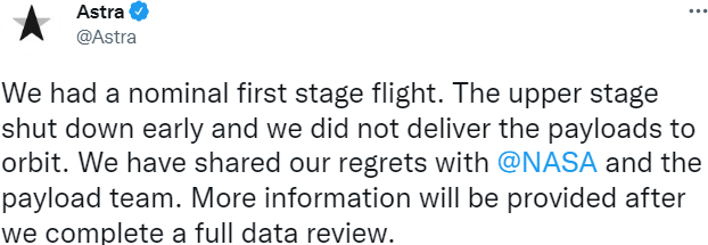NASA Still Optimistic After Astra Rocket Launch Failure Takes Out Two Satellites
Time-Resolved Observations of Precipitation structure and storm Intensity with a Constellation of Smallsats, or simply TROPICS, is one of NASA's weather related missions that looks to study the formation and development of tropical cyclones nearly every hour. This is about four to six times more often than possible with current satellites. Sunday's launch was the first of three, which had aimed to have a total of six satellites to cover more of the globe more frequently.
The issue seemed to occur about seven minutes post launch, as a flash below Rocket 3.3's upper stage appeared before its single engine prematurely shut down. The two satellites were part of the payload that was attached to the second stage, which began to tumble without thrust. The vehicle and payload crashed into the Atlantic a few minutes later.
In a post launch tweet, Astra commented, "We had a nominal first stage flight. The upper stage shut down early and we did not deliver the payloads to orbit." The space industry startup shared their regrets with both NASA and the payload team.
The California-based company focuses on smaller, cheaper options for the space industry. Astra says it utilizes off-the-shelf parts, commonly found materials, and shipping containers in order to launch from anywhere in the world as long as there is a concrete pad and internet connectivity. The company offers a base launch price just shy of $4 million.
In a blog post, NASA stated, "While we are disappointed in the loss of the two TROPICS CubeSats, the mission is part of NASA's Earth venture program, which provides opportunities for lower-cost, higher risk missions." The space agency now hopes to still meet its objectives with the four remaining CubeSats which will be launched with two more launches expected later this year.
Thomas Zurbuchen, associate administrator of science at NASA, remarked, "I am confident that in the future we will succeed in using this valuable launch capability to explore the unknown and give others the same opportunity to inspire the world through discovery."
Top Image Credit: Astra/NASA



